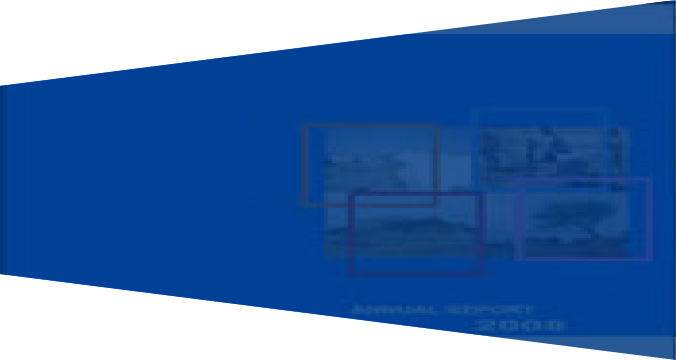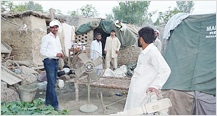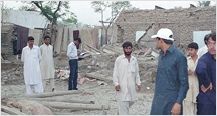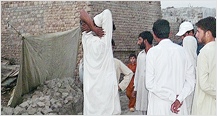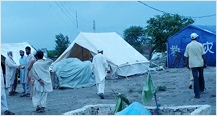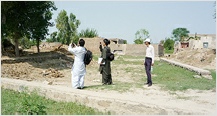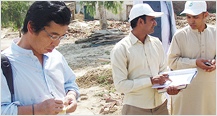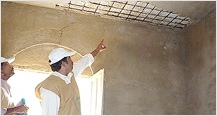Dedication to accountability and optimum transparency is central to our work, at an operational and management level. First and foremost we are accountable to the communities with whom we work. Good communication is key to achieving optimum transparency and we encourage open and honest dialogue, and listen carefully to people’s needs, ideas and feedback. Donor accountability is similarly important and we work hard to maintain and develop appropriate and effective reporting mechanisms. In addition to producing individual reports as necessary, each year we publish our annual report, providing a comprehensive account of our activities, finances, reflections and future goals. We continually achieve excellent results, monitored internally and externally by professional auditing bodies.
We are committed to strengthening our accountability and transparency to all our stakeholders. Our stakeholders include: individuals and communities we work with and for, as well as our members, supporters, activists, partners, staffs, volunteers and the general public. Our accountability information already publicly reported includes NWHO reports, accreditation, annual meetings to the community.
The NWHO properly maintains documents pertaining to financial transactions (balance sheets, income & expenditure statements etc.) in an easily retrievable form. Salaries and petty cash registers, fixed assets register etc. are regularly maintained. The audit is the review mechanism that provides assurance to senior management on the effectiveness of internal controls as well as coordinating the finance management process within the organization. It is done every year by professionally qualified accountants. The names of banks and auditors of the organization are circulated to the board members. An annual audit is conducted regularly and the audit report is duly circulated to the board members.
1. CODE OF CONDUCT FOR INTERNATIONAL RED CROSS AND RED CRESCENT MOVEMENT AND NGOS IN DISASTER RELIEF
We follow the Code of Conduct for the International Red Cross and Red Crescent Movements and NGOs in Disaster Relief.
1. The humanitarian imperative comes first.
2. Aid is given regardless of the race, creed or nationality of the recipients and without adverse distinction of any kind. Aid priorities are calculated on the basis of need alone.
3. Aid will not be used to further a particular political or religious standpoint.
4. We shall endeavour not to act as instruments of government foreign policy.
5. We shall respect culture and custom.
6. We shall attempt to build disaster response on local capacities.
7. Ways shall be found to involve programme beneficiaries in the management of relief aid.
8. Relief aid must strive to reduce future vulnerabilities to disaster as well as meeting basic needs.
9. We hold ourselves accountable to both those we seek to assist and those from whom we accept resources.
10. In our information, publicity and advertising activities, we shall recognise disaster victims as dignified human beings, not hopeless objects.
2. WANGO : CODE OF ETHICS AND CONDUCT FOR NGOS
We comply with and support the WANGO Code of Ethics and Conduct for NGOs. As a supporters of Code of Ethics and Conduct for NGOs, NWHO keeps its operation committed to The Code of Ethics & Conduct for NGOs, elaborated by the World Association of Non- Governmental Organizations (WANGO).
Summary: The WANGO code of ethics and conduct is designed to be broadly applicable to the worldwide NGO community. It is a set of fundamental principles, operational principles, and standards to guide the actions and management of non-governmental organizations working in different sectors and regions. It includes issues such as human rights, transparency and accountability, good governance, human resources and public trust, among others.
We maintain open financial records, so you can request a financial summary or an audited financial statement any time. Please email info@newworldhope.org.
3. THE SPHERE STANDARDS IN HUMANITARIAN AID
NWHO adheres to the Sphere Project’s Humanitarian Charter and Minimum Standards in Humanitarian Response. By applying and complying to the minimum standards in humanitarian response recommended by the Sphere Project. New World Hope Organization’s humanitarian response seeks to align and streamline its provision of services and aid to the common standards, as prescribed below:
- Ensuring participation
- Initial assessment
- Response
- Targeting
- Monitoring & Evaluation
- Aid worker competencies and responsibilities
- Supervision, management and support of personnel
4. PEOPLE IN AID:
NWHO is a member of People in Aid, a global network of development and humanitarian assistance agencies which promotes good practice in the management and support of aid personnel.
5. SOME KEY NETWORKS IN WHICH NWHO IS INVOLVED OR IS A SIGNATORY TO:
- Code of Conduct for the International Red Cross & Red Crescent Movement and NGOs in Disaster Relief
- The Core Humanitarian Standard on Quality and Accountability (CHS)
- The Sphere Project
- Active Learning Network for Accountability and Performance in Humanitarian Action (ALNAP)
- People in Aid
- Keeping Children Safe Coalition
- NGO Code of Good Practice
- Code of Ethics and Conduct for NGOs
- NGO Code of Conduct for Health Systems Strengthening Initiative




 Donate Now
Donate Now




 Donate Now
Donate Now



















